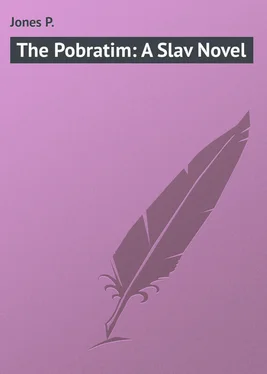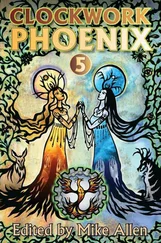P. Jones - The Pobratim - A Slav Novel
Здесь есть возможность читать онлайн «P. Jones - The Pobratim - A Slav Novel» — ознакомительный отрывок электронной книги совершенно бесплатно, а после прочтения отрывка купить полную версию. В некоторых случаях можно слушать аудио, скачать через торрент в формате fb2 и присутствует краткое содержание. Жанр: Прочие приключения, foreign_prose, на английском языке. Описание произведения, (предисловие) а так же отзывы посетителей доступны на портале библиотеки ЛибКат.
- Название:The Pobratim: A Slav Novel
- Автор:
- Жанр:
- Год:неизвестен
- ISBN:нет данных
- Рейтинг книги:3 / 5. Голосов: 1
-
Избранное:Добавить в избранное
- Отзывы:
-
Ваша оценка:
- 60
- 1
- 2
- 3
- 4
- 5
The Pobratim: A Slav Novel: краткое содержание, описание и аннотация
Предлагаем к чтению аннотацию, описание, краткое содержание или предисловие (зависит от того, что написал сам автор книги «The Pobratim: A Slav Novel»). Если вы не нашли необходимую информацию о книге — напишите в комментариях, мы постараемся отыскать её.
The Pobratim: A Slav Novel — читать онлайн ознакомительный отрывок
Ниже представлен текст книги, разбитый по страницам. Система сохранения места последней прочитанной страницы, позволяет с удобством читать онлайн бесплатно книгу «The Pobratim: A Slav Novel», без необходимости каждый раз заново искать на чём Вы остановились. Поставьте закладку, и сможете в любой момент перейти на страницу, на которой закончили чтение.
Интервал:
Закладка:
The mother, hearing her daughter speak, yawned, stretched out her arms and woke.
The storm had now abated. The dark clouds were quickly flitting, and the sun, which had risen upon that first day of the year, was now shining in all its splendour on the broad expanse of the blue waters and upon the huge crested waves; and the sight was as exhilarating as it was delightful.
The poor wrecked family having gathered together on deck, breakfast was got ready, and all sat down to the frugal meal which the ship's provisions afforded.
When the breakfast was over, the father of the young girl – who had been questioned several times as to the place from where he was coming, to the port whither he was bound, his occupation, and so forth – related to his hosts the story of his adventures, which can be abridged as follows:
"My name is Giulianic. Our family, though Slav and Orthodox, is said to have been of Italian origin, and that the name, years ago, was Giuliani. Still, I cannot swear as to the truth of this assertion. My father in his first youth had gone to the Levant, and had settled at Chios. He was a coppersmith; and, as far as I can remember, he was very prosperous. He had a large and well-furnished shop, and employed a good many workmen.
"I was the eldest of the family; after me there came a girl, who, happily for herself, died when she was yet quite a baby, and before trouble befel us; for had she been spared, she doubtless would have ended her life in some harem, if not in a worse way, losing thus both soul and body. After her came two boys; so that between myself and my youngest brother there was a difference of about ten years, if not more. I was, therefore, the only child of our family who knew the blessing of a happy boyhood, for my early years, spent either in my father's shop or in our country-house, were passed in bliss; but alas! that time is so far off that its remembrance is only like a dream.
"When I was about ten or twelve years – I cannot say exactly how old I was, as all the registers have been destroyed – a terrible revolution took place. It was, I remember, an awful time, when Christian blood ran in streams through the streets of towns and villages, when houses were burnt down, and the whole island remained a mass of smouldering ruins.
"My father was, if I am not mistaken, the first victim of that bloody fray; like all men of pluck, and indeed like most men of no pluck at all, he was butchered by the Turks. My mother – "
There was a pause. A tear glistened in the corner of the old man's eye, then it rolled down his wrinkled cheek and disappeared in the long, bristling white moustache; his voice faltered. Though more than half a century had passed since that dreadful day, still he could hardly speak about it. After a moment he added, drily:
"My mother fell into the hands of those dogs. I was separated from my brothers. The youngest, as I was told, was taken by those fiends. He was a bright, handsome boy; they made a Turk of him. My other brother disappeared; for days I sought him everywhere, but I could not find him.
"Before I go on with the story of my life, I must tell you that all the men in the Giulianic family have, since immemorial times, a bright red stain, like a small drop of blood, on the nape of the neck, just about where the collar-bone is bound to the skull. Its peculiarity is that its colour increases and decreases with the lunar phases. Besides this, my father in those troubled times, foreseeing that the day might come when we should be snatched from him, caused a little Greek Cross to be tattooed upon us."
Here, suiting the action to the words, he bared his left breast and showed us the holy sign just near the place where the heart is seen to throb.
"Thus, to resume the story of my life, when I was hardly twelve I found myself an orphan, alone and penniless. The night of that dreadful day I went to cry by the smouldering ruins of our house, looking if I could at least find the mangled remains of that father whom I loved so dearly. When morning came, I knew that I was not only turned adrift upon this wide world, but that I had to flee, whither I knew not. I lurked about in all kinds of hiding-places, and when I crawled out I always seemed to hear the steps and the voices of those bloodthirsty murderers. The falling leaf, the sudden flight of a locust, the chirrup of an insect filled me with terror, and indeed more than once, hidden within a bush or crouching behind a stone, I saw the tall zeibeks , those fierce-looking mountaineers, the scourge of the country far around, in search of prey. For days I managed to live, I really do not know how, but principally on oranges, I think. One day, being on the strand and seeing a vessel riding at anchor at some distance, I swam up to it. The captain, who was a Dalmatian, took pity on me, and brought me to Zara, whither his ship was bound. From that time I managed to drag on through life; still, I should not have been unhappy had I been able to forget.
"After several years of hard struggle, I at last went to Mostar; there fate, tired of persecuting me, began to be more favourable. I was prosperous in all my undertakings; I married; then my restlessness began to wear away, I thought I had settled down for life. Had I only been able to find out something about my lost brothers, I do not think anything more would have been wanting to my happiness.
"Years passed, aye, a good many years since those terrible days which had blighted my childhood, for my eldest child, who died soon afterwards, was then about the age I had been when I was bereft of kith and kin. It happened that one day – stop, it was on Easter Monday – I was having a picnic with some friends at a farm belonging to my wife's father. We were sauntering in the fields, enjoying the beauty of the country, which at that time was in all its bloom, when looking down from a height upon the road beneath, we saw a cloud of dust. We stopped to look, and we perceived at a few yards from us, two or three panting men evidently running for their lives.
"They were all armed, not only with daggers and pistols, but also with long muskets. At twenty paces behind them came half-a-dozen zaptiehs , or guards.
"The highwaymen, for such they seemed to us, evidently tired out, were losing ground at every step, and the Turks were about to overtake them. All at once the robbers reached a corner of the road, just under the hill on which we were standing; there the foremost man amongst them stopped, and after bidding the others to be off, he put his musket to his shoulder. When the zaptiehs came nearer, he called to them to turn back if they cared for their lives. There was a moment of indecision amongst the guards; each one looked upon his neighbour, wondering what he would do, when the one who seemed to be their officer took out his pistol and pointed it at the highwayman, calling to him to give up. For all reply, the robber took a deliberate aim at the Turk. Both men fired at once. The guards, astonished, stood back for a trice. The Turk fell, the highwayman remained unhurt; thereupon he laid by his gun and took out a revolver. The guards came up and fired off their weapons; the robber fell, apparently shot through by many balls.
"The zaptiehs stopped for a moment to look at their companion; they undid his clothes. Life was already extinct; the highwayman's bullet had struck him above the left breast, and, taking a downward course, it had pierced the heart. Death must have been instantaneous. By the signs of grief given to him, the man must have been admired and beloved by his companions; but their sorrow seemed all at once to melt into hatred and a thirst for revenge, so that they all rose and ran after the two fugitives, evidently hoping to overtake them.
"I can hardly describe the feelings that arose in my breast at that sight; it was the first time in my life that I had beheld the corpse of a Turk, not only without any feeling of exultation, but even with a sense of deep pity.
Читать дальшеИнтервал:
Закладка:
Похожие книги на «The Pobratim: A Slav Novel»
Представляем Вашему вниманию похожие книги на «The Pobratim: A Slav Novel» списком для выбора. Мы отобрали схожую по названию и смыслу литературу в надежде предоставить читателям больше вариантов отыскать новые, интересные, ещё непрочитанные произведения.
Обсуждение, отзывы о книге «The Pobratim: A Slav Novel» и просто собственные мнения читателей. Оставьте ваши комментарии, напишите, что Вы думаете о произведении, его смысле или главных героях. Укажите что конкретно понравилось, а что нет, и почему Вы так считаете.












